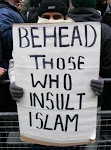A controversial anti-blasphemy law is being scrapped by the Dutch government. The move is remarkable as two of the current three members of the ruling coalition are Christian parties and they had originally wanted to maintain the ban.
In scrapping the law the cabinet is meeting the demand of parliament where a majority of parties argued that offering religious groups an extra layer of legal protection is outdated.
As an alternative the cabinet is now seeking to strengthen anti-discrimination laws against groups whatever their background, thus taking the religious component out of the equation.
Justice Minister Ernst Hirsch Ballin, says the law will now offer the same protection to all.
Freedom of speech/from discrimination
There has been much discussion about the balance between freedom of speech and the right not to be discriminated against in the past few years in the Netherlands, particularly around the role of Islam in society.
Populist politicians like Ayaan Hirsi Ali, who has now left the Dutch political scene, and Geert Wilders, have been constant critics of what they see as the negative influence of Islam on society. [...]
Threat of prosecution
The Dutch anti-blasphemy law was much talked about - against the backdrop of the continual criticism of Fitna and of its maker Geert Wilders - as a possible means of redress for those who felt offended. Stand-up comedians and cartoonists who sought to satirise extremist Islam have also found themselves being threatened with possible prosecution under the anti-blasphemy law in the past few years.
The discussion about the use of the law, which dates back to the 1930s, made a lot of people worried that the right to freedom of speech was being eroded and that the rights of the religious not to be offended was being given the upper hand....
It appears we were a little hasty in celebrating the demise of the Dutch blasphemy laws.
Danish journalist Flemming Rose has contacted MWW, relating the concerns of a Dutch colleague about this supposed repeal. All is not as it seems.
The intention is to introduce the concept of “indirect insult” and expand an existing law which protects people on the basis of race, age, disability, and sexual orientation to include protection on the basis of religion or “conviction”. This means that remarks directed at Islam, Christianity, Buddism or - depending on your interpretation of “conviction” - even homeopathy and astrology, could be interpreted as indirect insults to people, and prosecuted as such.
According to a commenter on the original story, this law carries a maximum sentence of 12 months, whereas the original defunct blasphemy law carried a maximum 3 month sentence.
Writes Rose:
This spring the Dutch minister of justice Hirsch Ballin wrote a note to parliament asking them to consider stiffening blasphemy laws. In the aftermath of the scandal surrounding the arrest of Gregorius Nekschot parliament refused to go along, and this proposal is the compromise that the government came up with.
12 years ago






















No comments:
Post a Comment